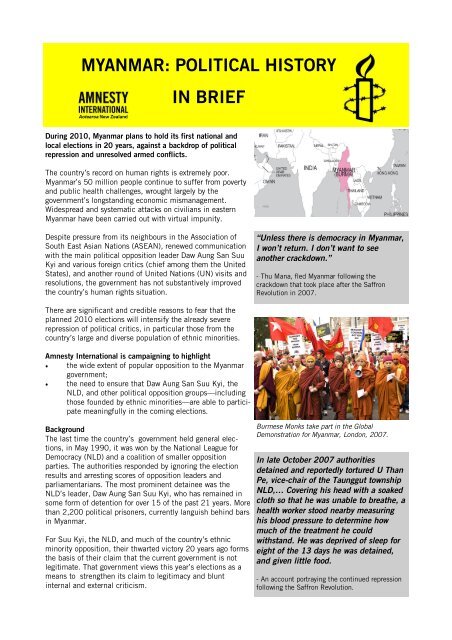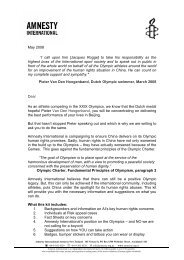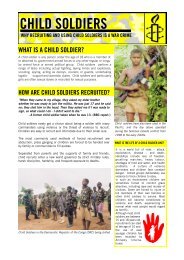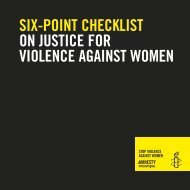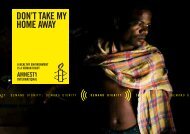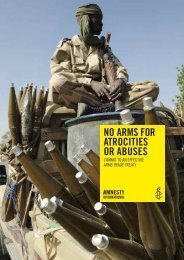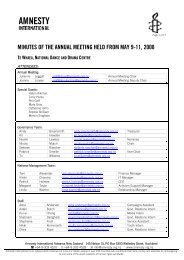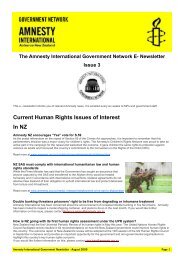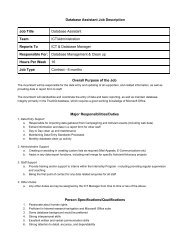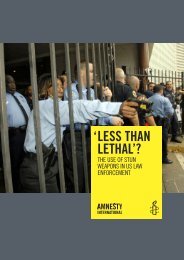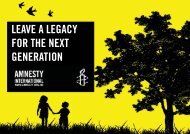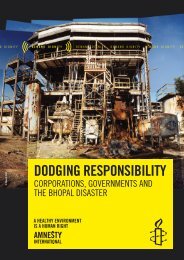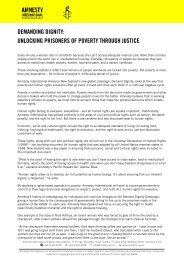MYANMAR: POLITICAL HISTORY IN BRIEF - Amnesty International
MYANMAR: POLITICAL HISTORY IN BRIEF - Amnesty International
MYANMAR: POLITICAL HISTORY IN BRIEF - Amnesty International
Create successful ePaper yourself
Turn your PDF publications into a flip-book with our unique Google optimized e-Paper software.
<strong>MYANMAR</strong>: <strong>POLITICAL</strong> <strong>HISTORY</strong><strong>IN</strong> <strong>BRIEF</strong>During 2010, Myanmar plans to hold its first national andlocal elections in 20 years, against a backdrop of politicalrepression and unresolved armed conflicts.The country’s record on human rights is extremely poor.Myanmar’s 50 million people continue to suffer from povertyand public health challenges, wrought largely by thegovernment’s longstanding economic mismanagement.Widespread and systematic attacks on civilians in easternMyanmar have been carried out with virtual impunity.Despite pressure from its neighbours in the Association ofSouth East Asian Nations (ASEAN), renewed communicationwith the main political opposition leader Daw Aung San SuuKyi and various foreign critics (chief among them the UnitedStates), and another round of United Nations (UN) visits andresolutions, the government has not substantively improvedthe country’s human rights situation.“Unless there is democracy in Myanmar,I won’t return. I don’t want to seeanother crackdown.”- Thu Mana, fled Myanmar following thecrackdown that took place after the SaffronRevolution in 2007.There are significant and credible reasons to fear that theplanned 2010 elections will intensify the already severerepression of political critics, in particular those from thecountry’s large and diverse population of ethnic minorities.<strong>Amnesty</strong> <strong>International</strong> is campaigning to highlightthe wide extent of popular opposition to the Myanmargovernment;the need to ensure that Daw Aung San Suu Kyi, theNLD, and other political opposition groups—includingthose founded by ethnic minorities—are able to participatemeaningfully in the coming elections.BackgroundThe last time the country’s government held general elections,in May 1990, it was won by the National League forDemocracy (NLD) and a coalition of smaller oppositionparties. The authorities responded by ignoring the electionresults and arresting scores of opposition leaders andparliamentarians. The most prominent detainee was theNLD’s leader, Daw Aung San Suu Kyi, who has remained insome form of detention for over 15 of the past 21 years. Morethan 2,200 political prisoners, currently languish behind barsin Myanmar.For Suu Kyi, the NLD, and much of the country’s ethnicminority opposition, their thwarted victory 20 years ago formsthe basis of their claim that the current government is notlegitimate. That government views this year’s elections as ameans to strengthen its claim to legitimacy and bluntinternal and external criticism.Burmese Monks take part in the GlobalDemonstration for Myanmar, London, 2007.In late October 2007 authoritiesdetained and reportedly tortured U ThanPe, vice-chair of the Taunggut townshipNLD,… Covering his head with a soakedcloth so that he was unable to breathe, ahealth worker stood nearby measuringhis blood pressure to determine howmuch of the treatment he couldwithstand. He was deprived of sleep foreight of the 13 days he was detained,and given little food.- An account portraying the continued repressionfollowing the Saffron Revolution.
It is highly unlikely that the government will repeat theconditions of 1990, when relatively open campaigning andvoting led to an election defeat for the government.TAKE ACTION NOW!Consolidation of powerTo a large extent, the government has alreadycemented its position ahead of the elections, as thecountry’s 2008 constitution ensures that the military willcontinue to dominate it.The constitution was “approved” in a referendum held aweek after Cyclone Nargis left nearly 140,000 dead ormissing, and displaced hundreds of thousands.The constitution contains strict requirements on theeligibility of presidential candidates, including:Ruling out Daw Aung San Suu Kyi because herchildren hold British citizenship;Reserving legislative seats for the military, effectivelygiving it veto power over constitutional amendments;Leaving the military in control of key securityministries and;Affording the military the authority to administer itsown affairs.Why <strong>Amnesty</strong> uses the name MyanmarIn 1989, the ruling government changed its name fromBurma to Myanmar. The change was recognised by theUnited Nations (UN).Although organisations and nations differ in what they callthe country, internationally both names are recognised.Burma is a colonial name, given by the British. The militarygovernment adopted the name Myanmar, to relate to aparticular ethnic majority in the region. The legitimacy ofboth names therefore, is questionable.<strong>Amnesty</strong> uses the names of countries that are registered withthe UN. Doing so means <strong>Amnesty</strong> avoids taking a politicalposition regarding the legitimacy of governments. It alsoprevents <strong>Amnesty</strong> from alienating governments that it istrying to influence, with the aim to improving the likelihoodof achieving vital aims to better human rights.Take action on behalf of Prisoner ofConscience Mie Mie who was detained solelyfor peacefully exercising her rights to freedomof expression, association and assembly.Mie Mie received a 65 year prisonsentence for her role in the peaceful Augustand September 2007 protests.Both her sentence of 65 years for peacefullyorganising for change in Myanmar and heron-going detention are an appalling breach ofher human rights.Write to General Than Shwe urging him to:Immediately and unconditionallyrelease Mie Mie;Ensure that Mie Mie is treated in linewith international law: that she isprovided with adequate food, anynecessary medical attention, andgranted access to family and lawyersimmediately.Address:Senior General Than ShweChairmanState Peace and Development Councilc/o Ministry of DefenceNaypyitawUnion of MyanmarLeft: National flag of MyanmarSalutation: Dear General Than Shwe<strong>Amnesty</strong> <strong>International</strong> is a global movement of 2.8 million supporters, members and activists in more than 150countries and territories who campaign to end grave abuses of human rights.Our vision is for every person to enjoy all the rights enshrined in the Universal Declaration of Human Rights and otherinternational human rights standards.We are independent of any government, political ideology, economic interest or religion – funded mainly by ourmembership and public donations.


